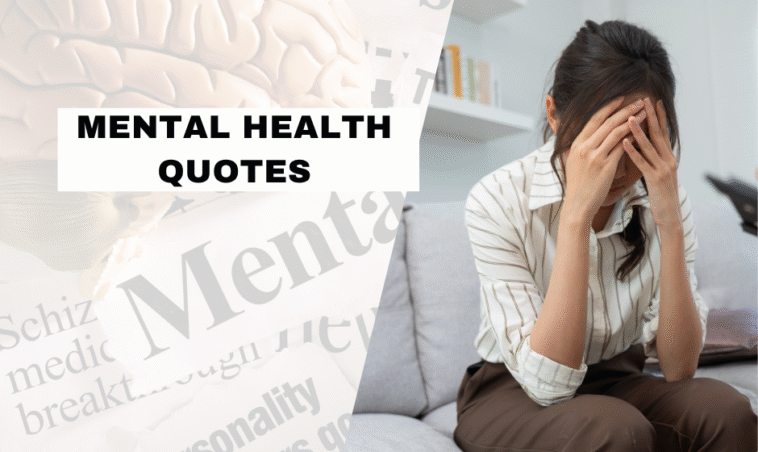Ever catch yourself in that late-night spiral where your brain becomes your worst enemy?
You know the feeling – replaying every awkward conversation from five years ago while simultaneously catastrophizing about tomorrow’s meeting.
Mental health quotes might seem like simple social media fodder, but the right words at the right moment health goals can literally rewire how you see yourself and your struggles.
Why Mental Health Quotes Actually Work
Your brain is basically a quote-collecting machine.
Think about it – you probably still remember that one thing your third-grade teacher said about your potential, or that cutting remark from a high school classmate.
The science behind this is fascinating: our brains are wired to remember emotionally charged statements because they help us navigate similar situations in the future.
Positive quotes about mental health work the same way, but in reverse.
They create new neural pathways that challenge those old, destructive thought patterns.
It’s like having a pocket-sized therapist who shows up exactly when you need them most.
The Self-Talk Revolution: Quotes That Reframe Everything
“You are not your thoughts – you are the observer of your thoughts”
This quote fundamentally changes the game.
Instead of being trapped inside your anxious mind, you become the scientist studying it.
Here’s how this works in real life:
- Next time anxiety hits, try saying “I notice I’m having the thought that I’m going to fail”
- Instead of “I’m having a panic attack,” try “I’m observing my body’s stress response”
- Replace “I’m worthless” with “I’m noticing some harsh self-criticism right now”
This tiny shift creates psychological distance between you and your thoughts.
You’re no longer drowning – you’re watching the waves from the shore.
“Your mental health is a priority, not a luxury”
This mental health awareness quote hits different when you realize how often we treat our minds like an afterthought.
You wouldn’t ignore a broken leg and expect it to heal while you keep running marathons.
Yet somehow we expect our minds to function perfectly while we pile on stress, skip sleep, and ignore warning signs.
Making mental health a priority looks like:
- Setting boundaries without feeling guilty
- Taking mental health days like you would sick days
- Investing in therapy the same way you’d invest in physical fitness
- Saying no to commitments that drain your emotional reserves
Quotes About Mental Health That Destroy Perfectionism
“Progress, not perfection”
This simple phrase demolishes the all-or-nothing thinking that keeps so many people stuck.
Your healing journey doesn’t need to look like a straight line climbing steadily upward.
Real progress looks messy, inconsistent, and human.
What this means practically:
- Celebrating small wins instead of dismissing them
- Viewing setbacks as data points, not failures
- Recognizing that “good enough” often IS good enough
- Understanding that growth happens in spirals, not straight lines
“You don’t have to be positive all the time – it’s perfectly okay to feel sad, angry, or anxious”
This quote gives you permission to be human.
Toxic positivity – that pressure to always look on the bright side – actually makes mental health struggles worse.
It’s like putting a Band-Aid over a wound that needs proper treatment.
Real emotional health includes the full spectrum of feelings, not just the “acceptable” ones.
The Comparison Trap: Quotes That Set You Free
“Comparison is the thief of joy, but it’s also the thief of progress”
Social media has turned comparison into a 24/7 sport.
But here’s what those highlight reels don’t show: everyone is fighting battles you can’t see.
That person posting about their perfect morning routine might be struggling with depression.
The friend sharing their career wins might be dealing with crushing impostor syndrome.
Breaking free from comparison means:
- Unfollowing accounts that trigger your insecurities
- Remembering that social media is performance, not reality
- Focusing on your own growth trajectory instead of others’ highlight reels
- Celebrating other people’s wins without making them about your “failures”
“Your only competition is who you were yesterday”
This reframe turns personal growth into a daily practice instead of a destination.
Instead of measuring yourself against impossible standards or other people’s journeys, you’re competing with your past self.
Yesterday you couldn’t get out of bed – today you made breakfast. That’s a win.
Last month you couldn’t handle criticism – this month you received feedback without spiraling. Progress.
Mental Health Awareness Quotes for Dark Days
“This too shall pass – it applies to both good times and bad times”
When depression hits, it feels permanent.
Your brain tells you this is your new reality, that you’ll never feel better, that hope is just a cruel joke.
But emotions, even the overwhelming ones, are temporary visitors.
This doesn’t mean:
- Invalidating your current pain
- Rushing the healing process
- Pretending everything is fine
It means:
- Holding space for both the pain and the possibility of change
- Making decisions based on your values, not your current mood
- Remembering that feelings are information, not instructions
“You have survived 100% of your difficult days so far – you’re doing better than you think”
This quote reframes your resilience.
You’re not weak for struggling – you’re incredibly strong for continuing to show up despite the struggle.
Every day you choose to keep going is evidence of your courage.
How Trending Toronto Helps You Navigate Mental Health Resources
While mental health and inspirational quotes can be powerful tools for reframing your mindset, they work best as part of a broader wellness strategy.
Trending Toronto recognizes this need by curating content that goes beyond surface-level inspiration.
The platform connects readers with practical resources, expert insights, and real-world applications of mental health concepts.
Unlike generic wellness sites that recycle the same tired advice, Trending Toronto:
- Provides timely, research-backed content on mental health trends
- Connects theoretical concepts to practical, everyday applications
- Shares diverse perspectives on wellness that reflect real experiences
- Offers informational content that helps readers make informed decisions about their mental health journey
This approach ensures that motivational quotes become stepping stones to genuine understanding and lasting change, rather than just temporary mood boosters.
Building Your Personal Quote Toolkit
The most powerful mental health quotes are the ones that resonate with your specific struggles and goals.
Here’s how to build your personal collection:
- Keep a quote journal – Write down phrases that hit different when you read them
- Screenshot meaningful quotes – Create a folder on your phone for easy access during tough moments
- Test them in real situations – See which quotes actually help when you’re stressed versus which ones just sound nice
- Personalize them – Adapt quotes to your specific situation and language
- Share them strategically – Post quotes that might help others, but avoid using social media as your only outlet
The Science Behind Transformational Quotes
Recent neuroscience research shows that positive self-talk and affirmations can actually change brain structure.
When you repeatedly expose yourself to empowering messages, you strengthen neural pathways associated with self-compassion and resilience.
This process, called neuroplasticity, means:
- Your brain remains changeable throughout your entire life
- Negative thought patterns can be interrupted and rewired
- Consistent positive input creates lasting psychological shifts
- Small daily practices compound into significant transformations
The key is consistency and authenticity – the quotes need to feel true to your experience, not just aspirational.
From Quotes to Action: Making the Shift Stick
Reading inspiring quotes feels good, but lasting change requires translating those insights into daily practices.
Turn your favorite mental health quotes into actionable habits:
- “Progress, not perfection” becomes celebrating one small win each day
- “You are not your thoughts” becomes a daily mindfulness practice
- “Your mental health is a priority” becomes scheduling regular self-care
- “This too shall pass” becomes riding out difficult emotions instead of avoiding them
The goal isn’t to become someone who never struggles – it’s to become someone who struggles with more awareness, self-compassion, and effective tools.
Conclusion
Mental health quotes aren’t magic spells that instantly cure depression or eliminate anxiety.
But they are powerful tools for interrupting destructive thought patterns and creating new possibilities for how you relate to yourself.
The right quote at the right moment can be the difference between spiraling into shame and choosing self-compassion.
Between giving up and trying one more time.
Between feeling alone in your struggle and remembering that healing is possible.
Start with one quote that resonates with your current situation and let it guide your actions today.
Your relationship with yourself is the longest one you’ll ever have – it’s worth investing in mental health quotes that support your growth and healing.
Ready to explore more resources for mental health and wellness? Connect with expert insights and practical guidance at Trending Toronto – where informational content meets real-world application for your personal growth journey.
Frequently Asked Questions
Q: How often should I read mental health quotes to see benefits?
Daily exposure works best for rewiring thought patterns. Keep 2-3 meaningful quotes accessible on your phone or write them where you’ll see them regularly, like your bathroom mirror or workspace.
Q: Can mental health quotes replace therapy or medication?
No, quotes are supportive tools, not treatments. They work best alongside professional help, healthy habits, and other evidence-based mental health practices. Always consult healthcare providers for serious mental health concerns.
Q: Why do some mental health awareness quotes feel fake or unhelpful?
Generic quotes often lack personal relevance. Choose quotes that acknowledge real struggle alongside hope, and avoid anything that promotes toxic positivity or oversimplifies complex mental health issues.
Q: How do I know if a mental health quote is actually helping me?
Helpful quotes create a sense of relief, understanding, or motivation to take positive action. If a quote consistently makes you feel worse or more hopeless, it’s not serving you.
Q: Should I share mental health quotes on social media?
Sharing can help others, but avoid using social media as your primary mental health support. Focus on quotes that genuinely resonate with you rather than what gets likes or engagement.





Panalowinlogin is alright. Not the best, but not the worst either. Got a good variety of games to choose from. Give it a spin at panalowinlogin.
Yo, decided to give 79k01 a shot after seeing it pop up online. Pretty straightforward sign-up and the site looks clean. Played a few hands of blackjack, and the experience was decent. Payouts seem fair. Definitely worth checking out if you’re on the hunt for a reliable platform. Find out more at 79k01.
RTP slot PG Popbra… now we’re gettin’ specific! PG Soft slots on Popbra huh? I’ll check the volatility before investing any real money! What a mouthful… rtp slot pg popbra
Alright, so I downloaded the 567LuckApkBet app. It’s okay, pretty standard rummy experience. Could be better, but it does the job. Download link’s here if you’re interested: 567luckapkbet